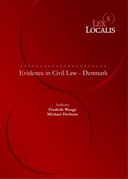Explore

Evidence in Civil Law - Denmark
Frederik Waage and Michael Herborn
2015
0 Ungluers have
Faved this Work
Login to Fave
Danish civil procedure is based on a number of procedural law principles that affect the taking of evidence, including the principle of party presentation, the principle of disposition, and the principle of free assessment of evidence. The nature of Danish procedural law tends towards the adversarial model rather than the inquisitorial model. Evidence is taken during the hearing and the principle of directness applies to the procedure. Danish civil procedure is governed by the 1916 Administration of Justice Act, which was originally strongly influenced by German law. The role of the judge is to lead the process and also to intervene in proceedings when uncertainty exists, rather than just to facilitate the process by ensuring the parties abide by the laws of civil procedure.
This book is included in DOAB.
Why read this book? Have your say.
You must be logged in to comment.
Rights Information
Are you the author or publisher of this work? If so, you can claim it as yours by registering as an Unglue.it rights holder.Downloads
This work has been downloaded 216 times via unglue.it ebook links.
- 127 - pdf (CC BY) at OAPEN Library.
Keywords
- Access to Justice
- Burden of proof (law)
- case law
- Civil procedure
- Criminal procedure
- Danelaw
- Denmark
- due process
- Expert witness
- fair trial
- free assessment
- law of evidence
- Letters rogatory
- Oral stage
- Political structure & processes
- Politics & government
- Procedural law
- Society & Social Sciences
- thema EDItEUR::J Society and Social Sciences::JP Politics and government::JPH Political structure and processes
Links
DOI: 10.4335/978-961-6842-46-4Editions

